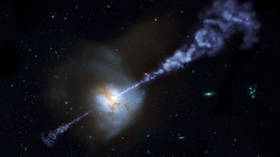Groundbreaking black-hole study reveals universe growing faster than previously imagined

Scientists using supermassive black holes to measure how fast the universe is growing have produced some extraordinary results that may require “new physics” to explain.
Universal expansion, measured in a rate known as the Hubble constant, is a well-known phenomenon. However, its exact pace has eluded astronomers for some time as it seems to depend on where they look and how they measure it (which is why the boffins at both NASA and the ESA came to different, contradictory conclusions).
Also on rt.com There’s a galaxy hurtling towards our Milky Way that could wipe out life on EarthNow, in an innovative study, an international team of scientists at Durham University and the Universita degli Studi di Firenze, Italy, used observation data taken from 1,600 black holes at the centers of their distant galaxies to measure the rate of growth in a novel way. What they found has led them to conclude that the universe is, in fact, growing faster than previously thought.
“Black holes are the most luminous persistent sources of the universe and allow us to measure its expansion rate at very early times,” explained Dr Elisabeta Lusso from Durham University.
Black holes emit huge amounts of ultraviolet and x-ray radiation, and can act as beacons to help track the universe’s rate of expansion.
While the results are fascinating, they may pose more questions than they answer, requiring an overhaul of physics itself in the process.
READ MORE: Epic ‘stellar explosion’ captured on camera points to birth of a black hole (PHOTO)
“We may need to explore new physics, for example rethinking the potential properties of dark energy,” Lusso said.
Her colleague Dr Guido Risaliti agreed, positing that the mysterious substance known as dark energy may be the explanation, though he stressed that this is only one of many models which may explain the unusual findings.
“One of the possible solutions to the expansion of the early universe would be to invoke an evolving dark energy, with a density that increases as time goes by,” Risaliti said. The team’s findings were published in the journal Nature Astronomy.
Like this story? Share it with a friend!













